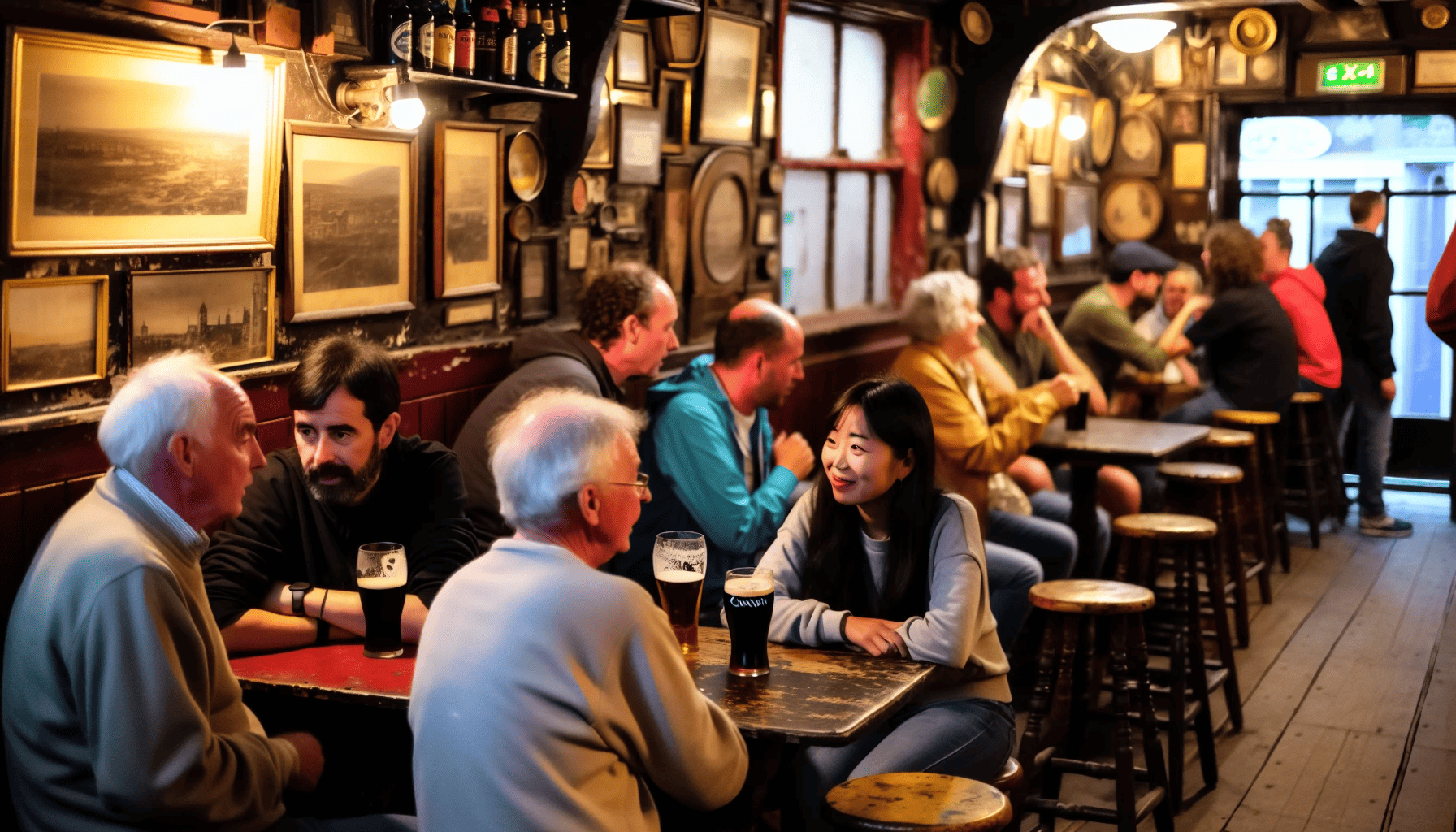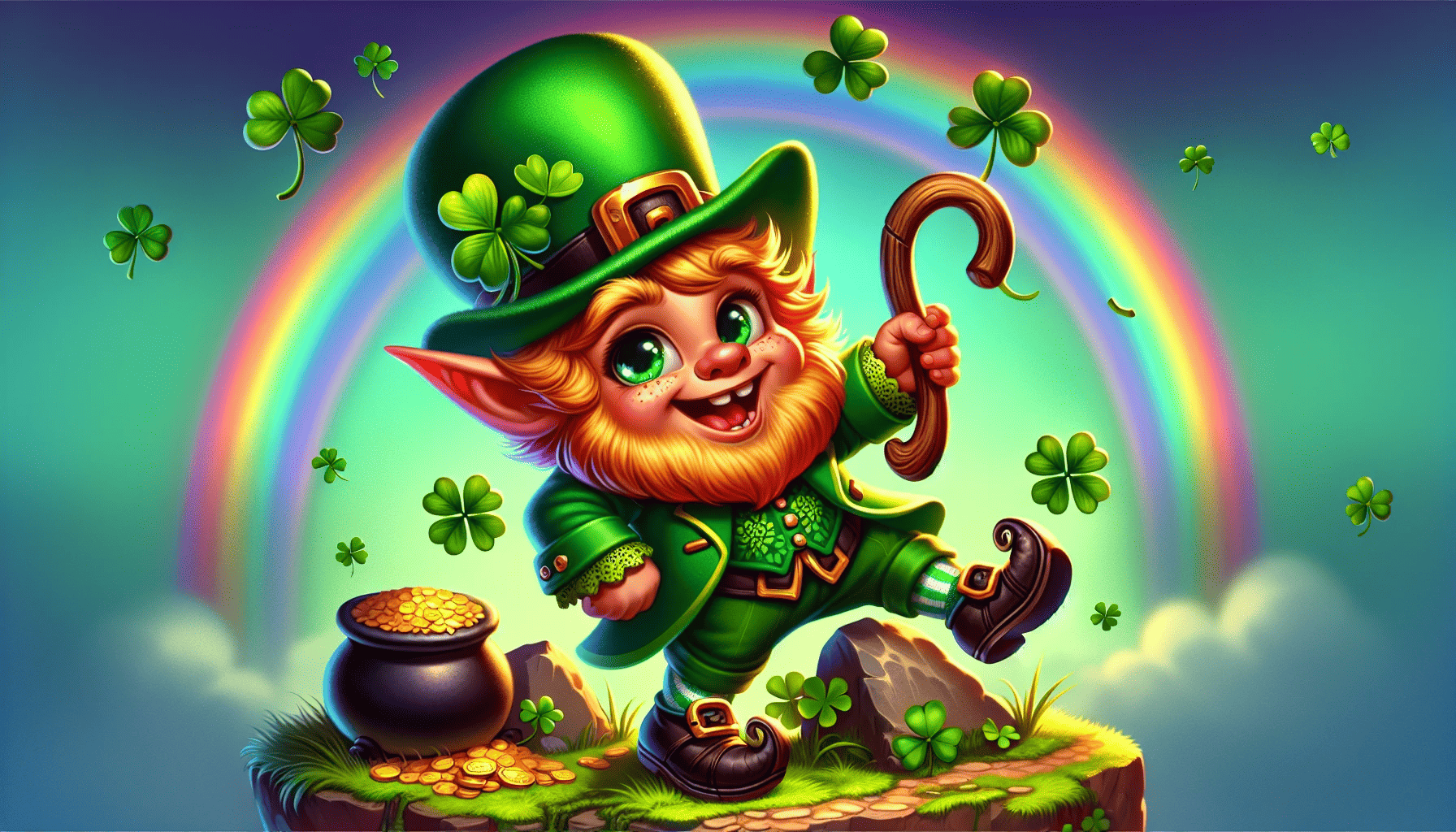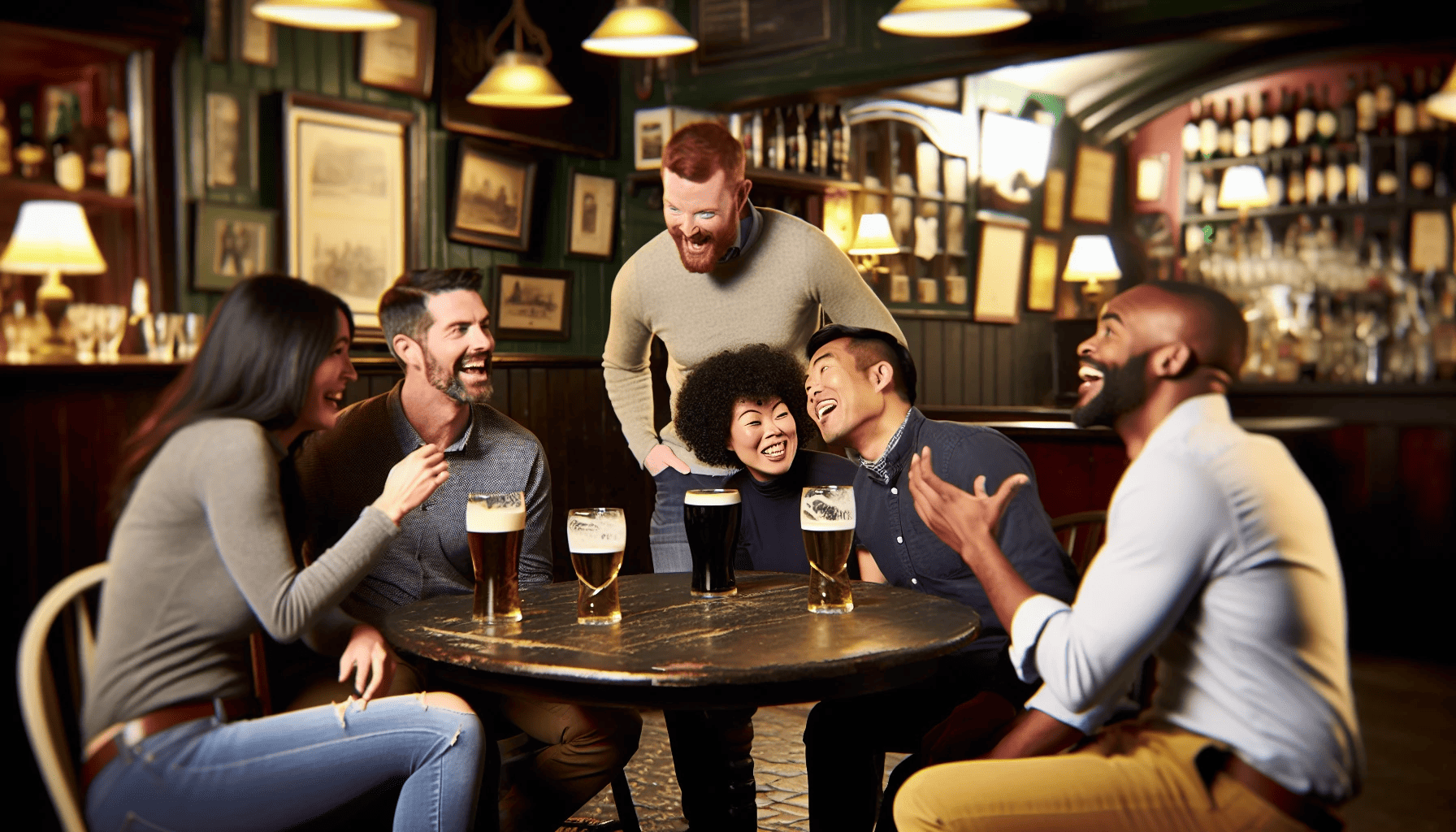Ah, the Irish – known for their quick wit and charming banter! Their insults are no exception, often infused with a delightful blend of creativity and humor that sets them apart from the rest. In this blog post, you’ll unravel the mysteries and charm of Irish insults, the influence of Gaelic and Irish culture, and the ingenious ways the Irish come up with these cheeky jibes. So, let’s dive into the whimsical world of Irish insults and discover their witty charm!
Key Takeaways
Irish insults are a tapestry of Gaelic wit and banter.
From ‘Eejit’ to ‘Cute Hoor’, there’s something for everyone in the Irish language!
Mastering the art of witty banter with your friends is an essential part of Irish culture, just remember to keep it lighthearted and respectful!
The Art of the Irish Insult: A Tapestry of Wit and Banter

Oh, the art of the Irish insult! It’s a tapestry of wit and banter that can only be crafted by the Emerald Isle’s finest. The Irish have a unique way of insulting others in a manner that doesn’t sting too much, blending humor and creativity in their jibes and banter. You might have heard phrases like “Sh*tehawk” or “Eejit,” but what about “Narkey hole” or “He peels his oranges in his pocket”? These creative Irish words and insults are derived from the Irish language, showcasing their Gaelic heritage with pride.
From the gentle jibe of “Eejit” to the sly dig of “Cute Hoor,” Irish insults are a testament to the playful nature of the Irish people. They can be endearing and light-hearted, yet pack enough punch to leave an impression. The Irish are known for their quick wit, and their clever choice of words is no exception. Let us examine some of the best Irish insults and their affectionate usage.
The Gentle Jibe: ‘Eejit’ and Its Endearing Usage
‘Eejit’ is a popular Irish insult that can be used endearingly among friends, showcasing the gentle side of Irish teasing. Derived from a dialectal spelling of the Irish and Scottish English pronunciation of ‘idiot,’ ‘Eejit’ is a cheeky slang term that can be both a jab and a term of affection. It’s used to describe someone as a doofus or a total goofball, much like a cat trying to eat with a fork.
Commonly used in Irish conversation, ‘Eejit’ is not considered overly offensive, making it the perfect term for some light-hearted ribbing among pals. It’s all in good fun, and the Irish are known for their ability to poke fun at themselves and others without causing too much hurt.
Thus, if you find yourself in the midst of Irish banter, feel free to use the term ‘Eejit’ and participate in the fun, or even throw in an “imeacht gan teacht ort” to show your knowledge of Irish phrases!
The Sly Dig: ‘Cute Hoor’ as a Crafty Compliment
‘Cute Hoor’ is another sly compliment used in the Irish vernacular. It’s a cheeky way to describe someone crafty or clever, often with a hint of admiration and a twinkle in the eye, much like when a nurse slapped the doctor. The origin of the phrase ‘Cute Hoor’ in Irish slang is shrouded in mystery, but it’s used to describe someone who’s crafty and knows how to get their way, like a beach ball that always finds its way back to the shore.
The term ‘Cute Hoor’ itself is quite self-explanatory, used in a sentence to describe someone as a sly fox or a cunning character, usually with a dash of admiration or charisma. It refers to a cultural context of slyness, craftiness, and cunning in Ireland, often used to describe individuals who are clever and resourceful, particularly in navigating political or business situations for a quick profit. The term can have both positive and negative connotations, depending on the context in which it is used – basically, it’s a way of saying ‘this person is a bit of a sly one’.
The Friendly Tease: ‘Thick’ and its Double Meaning
‘Thick’ is another friendly tease in Irish slang that can mean both foolish and angry-looking, depending on the context. The origin of the term ‘thick’ as an Irish insult is a total mystery, but it’s used to describe a fool or someone who’s a bit slow on the uptake in Irish English. It can also describe someone who looks like they’ve been sucking on a lemon, giving it a double meaning that’s perfect for a light-hearted jab among friends.
To sum up, the playful jab ‘thick’ demonstrates the cheerful nature of Irish insults. It can reference both silliness and a grumpy expression, making it a fitting term for friendly teasing among friends. Thus, on your next visit to an energetic Irish gathering, feel free to label someone as ‘thick’ and observe their reaction – but brace yourself for a clever retort!
Irish Slang and the Linguistic Landscape of Insults

Irish slang is rich with insults that describe dull or daft individuals, such as ‘Dry Shite’ and ‘Dope,’ as well as gendered gibes like ‘Wagon’ and ‘Gobshite.’ The linguistic landscape of Irish insults is brimming with colorful phrases that showcase the not-so-bright, as well as cheeky jabs at gender. Certainly, the Irish have a wealth of insults that enable them to dismantle the English language and reconstruct it in a manner that would leave Shakespeare reaching for his dictionary while dancing in his grave.
From describing someone as “not the sharpest crayon in the box” to painting a picture of someone like “a pig trying to understand the mysteries of quantum physics,” Irish slang offers a wide range of ways to poke fun at the dull and daft in society. Let us examine some of these vibrant phrases and their unique role in Irish slang.
From ‘Dry Shite’ to ‘Dope’: Describing the Dull and Daft
‘Dry Shite’ and ‘Dope’ are two such phrases used to describe the dull and daft in Irish slang. The term ‘Dope’ is thought to be derived from the Irish word ‘gabhdán,’ meaning ‘gullible person.’ It’s used to describe someone who’s a bit of a goofball or not the sharpest tool in the shed. On the other hand, the origin of ‘Dry Shite’ remains a mystery, but it certainly doesn’t pull any punches when it comes to describing someone who’s not too swift on the uptake.
In Irish conversation, the word ‘dope’ can be used as a term of endearment, to describe something totally awesome or super interesting, or to lovingly tease someone about their lack of intelligence. ‘Dry Shite,’ while not as endearing, still carries a similar sentiment of describing someone who’s not the brightest bulb in the box.
Hence, whether you’re jesting with friends or participating in congenial banter among coworkers, the terms ‘Dry Shite’ and ‘Dope’ will undoubtedly add a vibrant touch to your discussions.
‘Wagon’ and ‘Gobshite’: Gendered Gibes and Their Place in Irish Slang
Gendered gibes in Irish slang, such as ‘Wagon’ and ‘Gobshite,’ play a unique role in the linguistic landscape of insults. ‘Wagon’ is an Irish insult used exclusively for women, while ‘Gobshite’ refers to someone who is spouting off gibberish or is missing a few facts in their pocket. The origins of these terms are shrouded in mystery, but they’ve become integral parts of Irish slang, showcasing the witty and imaginative nature of the Irish people.
These gendered insults are used in a variety of contexts, often teasing or poking fun at someone’s behavior or appearance. They hold a special place in the hearts of the Irish people, as they showcase the creative and good-natured spirit of Irish insults. Hence, whether you’re throwing around terms like ‘Wagon’ or ‘Gobshite’, you’re bound to elicit laughter and maybe even ignite a spirited conversation.
Crafting Curses: The Irish Way with Words

The Irish have a unique way of crafting curses that invoke misfortune or absurd situations, showcasing their talent for comedic condemnations. From wishing someone “bad luck” to more imaginative curses like “May the lamb of God stir his hoof through the roof of heaven and kick you in the arse down to hell,” Irish curses are a testament to their way with words.
These curses often carry a lighthearted quality, reflecting the belief that words have power and the importance of using language in a jovial and witty way. Invoking misfortune in Irish curses is a tradition that adds a bit of whimsy to their insults, making them all the more enjoyable to use in conversation.
Let’s examine how the Irish craft curses and how they incorporate misfortune and absurdity into their language.
Invoking Misfortune: ‘Bad Luck’ and Beyond
Invoking misfortune in Irish insults is a jovial way to express displeasure and showcase the Irish flair for language. From the simple phrase ‘bad luck’ to more colorful curses like “May you wither up by the fire of hell soon and sudden” or “May the flesh rot off your bones and fall away putrid,” the Irish have no shortage of creative ways to wish misfortune on someone. These curses are often used in jest and not meant to be taken too seriously, reflecting the playful nature of Irish culture and their love for delivering comedic put-downs.
Whether you’re teasing a friend or engaging in some friendly banter with a stranger, invoking misfortune in Irish curses adds a unique and amusing touch to your conversations. Thus, the next time you need a curse, consider using an Irish one and observe the response you receive.
Comedic Condemnations: Wishing the Absurd and Amusing
The Irish have a penchant for comedic condemnations, often wishing the absurd and amusing on others in their insults. From phrases like “feckin’ eejit” to “ya muppet,” these absurdly hilarious curses showcase the Irish people’s love for a good laugh and their talent for crafting witty and charming insults.
These comedic condemnations are a lighthearted way to express one’s feelings and engage in some fun bantering. They’re often used to poke fun at someone’s actions or appearance, adding a touch of humor and levity to the conversation.
Hence, whether you aim to inject some wit and charm into your conversation or simply wish to share a laugh with a friend, Irish insults provide a rich array of comedic condemnations ready to be explored.
The Social Side of Slinging Slang: When and Where to Use Irish Insults

Using Irish insults in social situations requires an understanding of when and where it’s appropriate to engage in banter and navigate the nuances of politeness. From jovial banter among friends to more formal settings, knowing when and where to use Irish insults is integral to maintaining the proper balance between humor and respect.
As a general rule of thumb, Irish insults should be used in a lighthearted and playful manner, with the understanding that they’re not meant to be taken too seriously. However, it’s important to be aware of the atmosphere and the feelings of the people involved, ensuring that you don’t accidentally offend anyone with your choice of words.
Let’s examine the social aspect of using slang and the guidelines for employing Irish insults in diverse situations.
Banter Among Friends: The Rules of Engagement
When engaging in banter among friends, the rules of engagement are simple:
Keep it lighthearted, fun, and always in good humor.
Irish insults are often used in jest and as a form of affection, so it’s important to remember that they should be taken in stride and not taken too seriously.
Moreover, it’s essential to be aware of the feelings of the people involved and to make sure everyone is comfortable with the level of teasing taking place.
As you navigate the world of Irish banter, remember to keep your wit sharp and your humor on point. Engaging in witty repartee with friends is a beloved part of Irish culture, and mastering the art of the comeback is essential for any Irishman or woman looking to hold their own in a friendly exchange of insults.
Go ahead – enjoy a pint with your friends and try out some Irish banter!
Public Places and Politeness: Navigating the Nuances
When it comes to using Irish insults in public places, the key is to navigate the nuances of politeness while still engaging in lighthearted banter. While the Irish are known for their wit and humor, it’s important to gauge the atmosphere and ensure that everyone involved is comfortable with the level of teasing taking place.
For non-Irish residents or tourists, it’s important to remember that Irish insults are often used in a jovial and humorous way rather than with any ill-will. If faced with an Irish insult, the best thing to do is to respond with a good-natured attitude and not take it to heart. Engaging in some friendly banter and demonstrating a sense of humor can help you sail through these situations with ease.
Hence, whether you’re touring the Emerald Isle or just enjoying a pint at your local Irish pub, keep your wit keen and your humor alive as you traverse the vibrant world of Irish insults.
Decoding the Depth of ‘Feck’: Not Just Another Swear Word
‘Feck’ is more than just a swear word in Irish culture, with a depth of meaning and usage that sets it apart from its English counterpart. While it’s often used in the same way as the English ‘f-word,’ ‘Feck’ has a lighthearted quality and is usually tolerated in Irish culture. It hails from the Gaelic languages of Ireland and Scotland, showcasing the influence of the Irish language on their choice of swear words.
The origins of ‘Feck’ are a bit of a mystery, but it is believed to have been ‘born’ from a Scottish variant of the word ‘effect’ in the 15th century. It could also be traced back to the Irish word for ‘see,’ which is ‘féach’. Regardless of its origins, ‘Feck’ has carved a unique place for itself in Irish slang and serves as a prime example of the Irish people’s penchant for playful language and inventive insults.
The Echoes of Gaelic: How Irish Language Influences Insults
The influence of the Irish language can be seen in the creative and imaginative insults used by the Irish people, echoing their Gaelic heritage. From the endearing ‘Eejit’ to the witty ‘Gobdaw,’ these Irish insults showcase the depth of the Irish language and its impact on their choice of words.
The Irish people’s knack for cursing could be attributed to their dual-language heritage and their love of language. Their Gaelic roots have given them a plethora of insults that allow them to take the English language and tear it apart before reassembling it in a way that would have Shakespeare reaching for his dictionary while doing a jig in his grave. The Irish language’s influence is undeniable, and it has left an indelible mark on the colorful and imaginative insults that the Irish people so proudly sling.
The Global Journey of Irish Insults: From Ireland to the Big Shmoke
Irish insults have traveled the world, finding their way into global conversations and popular culture, from Ireland to the “Big Shmoke” (Dublin). The worldwide influence of Irish insults is undeniable – everyone loves a good Irish curse word or insult! They’ve become popular for their unique and witty charm, often used as a form of humor or good-natured ribbing.
From the gentle jibe of ‘Eejit’ to the sly dig of ‘Cute Hoor,’ Irish insults have made their mark on the international stage. They’ve become a key part of global dialogue and culture, showcasing the wit and charm of the Irish people. So, whether you’re in the heart of the Emerald Isle or halfway across the world, you can’t escape the influence of these playful and imaginative Irish insults.
Responding to Ribbing: The Art of the Comeback

Knowing how to respond to Irish ribbing is an art in itself, requiring a quick wit and a good sense of humor to craft the perfect comeback. When faced with a clever Irish insult, it’s important to keep your cool and respond with a witty retort that demonstrates your own linguistic prowess and sense of humor.
Irish comebacks often incorporate linguistic features of Irish English or Gaelic, showcasing the depth and creativity of the Irish language. So, whether you’re facing a friendly tease or a more cutting jibe, remember to keep your wit sharp and your humor on point as you craft the perfect Irish comeback.
Summary
In conclusion, Irish insults showcase the wit, charm, and creativity of the Irish people and their Gaelic heritage. From endearing jibes to sly digs, Irish insults are a delightful way to engage in banter and showcase the unique linguistic landscape of Ireland. So, don’t be afraid to embrace the whimsical world of Irish insults and add a touch of wit and charm to your conversations!
Frequently Asked Questions
What is the Irish swear word?
It appears that “feck” is the most popular Irish swear word – so let’s just say it’s our polite way of saying the ‘F’ word! If you’re feeling bold, you could also try out “bollox” or “arse” for a milder swear.
What is a dryshite?
Calling someone a dryshite is the ultimate insult in Ireland – it’s a slang term for a dull, boring person who can’t be fun. If you want to get creative with your insults, look no further than this Irish gem.
What is the Irish word for curse?
Ah, the sweet Gaelic language! The Irish word for curse is “mallacht,” derived from Latin maledicti (“curse, condemnation, slander”).
What makes Irish insults unique?
Irish insults are renowned for their clever wit, charming nature and imaginative flair, making them truly unique and a delight to experience!
How do the Irish insult each other in a friendly manner?
The Irish often use gentle jibes like ‘Eejit’ and sly digs like ‘Cute Hoor’ in friendly banter, showing their humorous nature.

